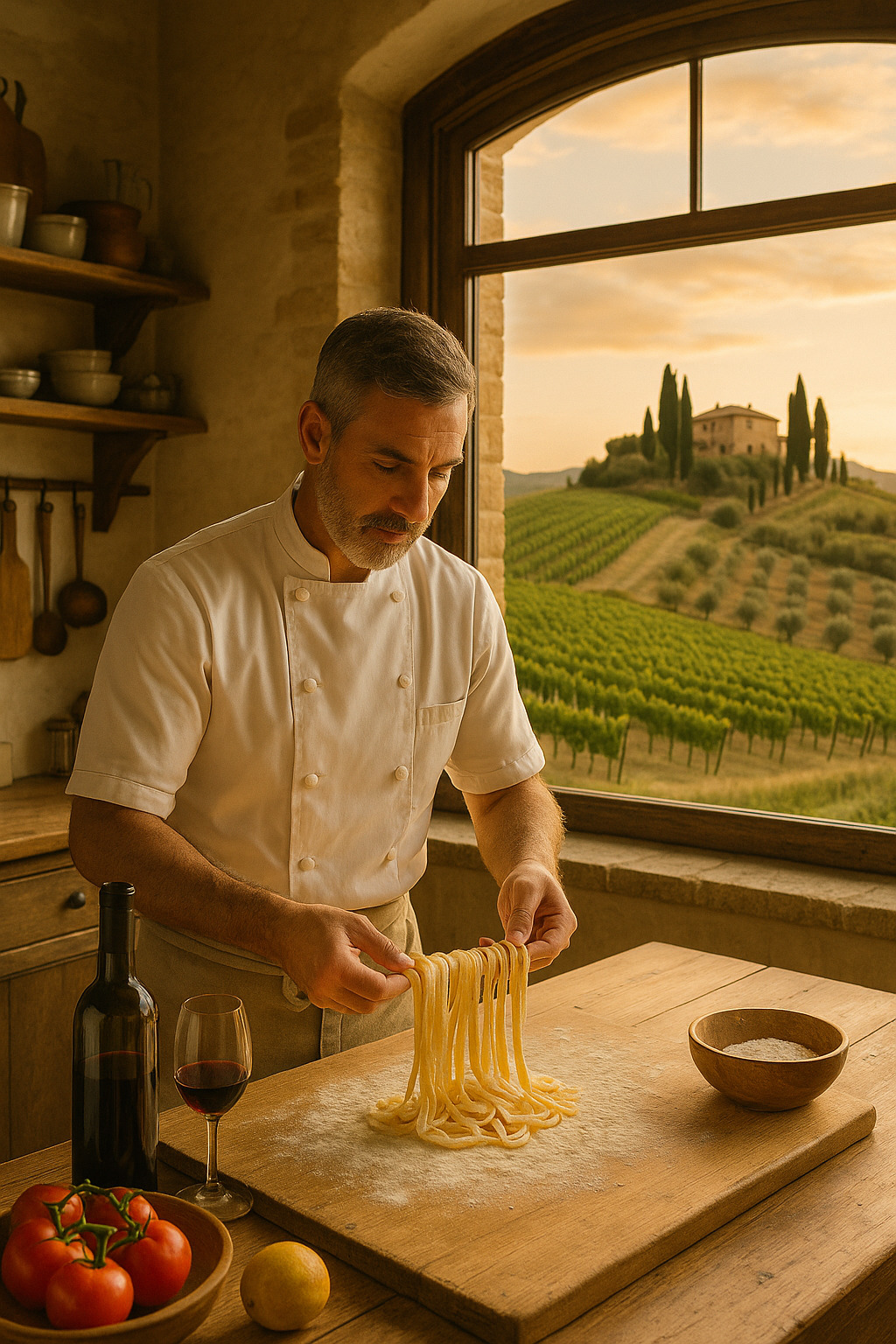
Culinary Travel Experiences: A Foodie's Guide to Tasting the World
Embark on a gastronomic journey with our guide to the world's best culinary destinations, cooking classes, and food experiences that define authentic travel.

Culinary Travel Benefits:
- • Authentic cultural immersion through local flavors
- • Support local communities and traditional techniques
- • Learn new skills from expert chefs and home cooks
- • Create lasting memories through shared meals
Food is the universal language of culture, history, and human connection. More than sustenance, cuisine tells the story of a place—its climate, traditions, trade routes, and values. Culinary travel offers the most authentic and delicious way to understand a destination, connecting you directly with local people and their ancestral knowledge.
As someone who has organized culinary journeys to over 40 countries, I've learned that the most transformative travel experiences happen around the table. Whether it's learning pasta-making from an Italian nonna, foraging for mushrooms in the French countryside, or sharing a home-cooked meal with a family in Morocco, food creates connections that transcend language and cultural barriers.
The Art of Culinary Travel Planning
Successful culinary travel requires more than just good restaurants. It's about understanding the cultural context of food, timing your visit with seasonal ingredients, and creating opportunities for meaningful exchange with local food artisans.
Seasonal Considerations for Food Travelers
Spring Culinary Adventures
- Japan: Cherry blossom season and kaiseki cuisine
- France: Asparagus, morel mushrooms, and spring wines
- Italy: Fresh peas, artichokes, and spring lamb
- California: Wine country awakening and farm tours
- Greece: Easter celebrations and island flavors
Autumn Harvest Experiences
- Tuscany: Grape and olive harvest seasons
- Germany: Oktoberfest and harvest festivals
- India: Post-monsoon spice harvests
- Morocco: Date harvests and tagine season
- Peru: Quinoa harvest and potato festivals
World-Class Culinary Destinations
Italy: The Cradle of Culinary Tradition
Italy remains the ultimate culinary destination, where food traditions date back millennia and regional diversity creates endless opportunities for discovery. From the truffle hills of Piedmont to the seafood coast of Sicily, each region offers unique flavors and techniques.
Must-Experience Italian Food Regions:
- Emilia-Romagna: Parmigiano-Reggiano, prosciutto di Parma, and balsamic vinegar
- Tuscany: Chianti wines, wild boar, and olive oil tastings
- Campania: Buffalo mozzarella, San Marzano tomatoes, and pizza napoletana
- Sicily: Seafood, citrus fruits, and cannoli making
- Piedmont: White truffles, Barolo wines, and hazelnuts
France: Culinary Excellence and Technique
French cuisine represents the pinnacle of culinary technique and sophistication. From Michelin-starred restaurants to local bistros, France offers unparalleled opportunities to learn from master chefs and understand the foundations of Western cooking.
Japan: Precision, Seasonality, and Umami
Japanese cuisine elevates simplicity to an art form, emphasizing seasonal ingredients, precise technique, and the fifth taste—umami. From sushi masters in Tokyo to temple cuisine in Kyoto, Japan offers profound culinary wisdom.
Peru: Ancient Ingredients, Modern Innovation
Peru's culinary renaissance has made Lima a global gastronomic capital. The country's biodiversity—from Amazonian fruits to Andean grains—combined with influences from Japanese, Chinese, and Spanish cuisines, creates a unique and exciting food culture.
Types of Culinary Experiences
Hands-On Cooking Classes
The most immersive way to understand a cuisine is to learn its techniques directly from local cooks. The best cooking classes combine instruction with cultural education and often include market visits.
Anna's Cooking Class Selection Criteria
Authentic Instruction: Classes led by local chefs or home cooks, not tourist-focused operations
Market Integration: Experience includes shopping for ingredients in local markets
Cultural Context: Instruction includes history and cultural significance of dishes
Take-Home Value: Recipes and techniques you can recreate at home
Intimate Setting: Small groups for personalized attention and interaction
Market Tours and Food Walks
Local markets are the heart of any food culture. Guided market tours provide insight into ingredients, shopping customs, and the social aspects of food procurement while offering tastings of local specialties.
- Barcelona's La Boquería: Jamón ibérico, fresh seafood, and Catalan specialties
- Istanbul's Grand Bazaar: Spices, Turkish delights, and traditional street food
- Bangkok's Chatuchak: Exotic fruits, Thai street food, and cooking ingredients
- Melbourne's Queen Victoria Market: Artisanal cheeses, fresh produce, and coffee culture
- Marrakech's Jemaa el-Fnaa: Moroccan spices, tagines, and traditional sweets
Farm-to-Table Experiences
Understanding food at its source—on farms, vineyards, and ranches—provides deeper appreciation for ingredients and the hard work behind exceptional cuisine. These experiences often include harvesting, processing, and cooking activities.
Wine and Spirits Journeys
No culinary journey is complete without understanding the beverages that complement local cuisine. Wine regions, distilleries, and traditional brewing methods offer their own rich cultural experiences.
Classic Wine Regions
Old World Traditions
- Burgundy, France: Pinot Noir and Chardonnay mastery
- Tuscany, Italy: Chianti and Super Tuscan innovations
- Rioja, Spain: Tempranillo and traditional aging methods
- Douro Valley, Portugal: Port wines and terraced vineyards
- Mosel, Germany: Riesling and steep vineyard slopes
New World Pioneers
- Napa Valley, USA: Cabernet Sauvignon excellence
- Barossa Valley, Australia: Shiraz and wine innovation
- Mendoza, Argentina: Malbec and high-altitude viticulture
- Stellenbosch, South Africa: Diverse varieties and wine estates
- Central Valley, Chile: Value and quality combinations
Spirits and Traditional Beverages
Each culture has its signature spirits and traditional beverages. Understanding these drinks—their production methods, cultural significance, and proper enjoyment—adds depth to culinary travel.
Signature Spirit Experiences:
- Scotland: Single malt whisky distillery tours and tastings
- Mexico: Tequila and mezcal production in Jalisco and Oaxaca
- Japan: Sake brewing and whisky distillery innovations
- Caribbean: Rum production and sugar plantation history
- Kentucky, USA: Bourbon trail and American whiskey traditions
Luxury Culinary Experiences
Luxury culinary travel combines exceptional food experiences with premium service, exclusive access, and personalized attention. These experiences often provide behind-the-scenes access to renowned restaurants and legendary food artisans.
Michelin-Starred Restaurant Experiences
Dining at the world's finest restaurants is about more than just exceptional food—it's about understanding culinary artistry at its highest level. The best luxury dining experiences include chef interactions, kitchen tours, and wine pairings.
Private Chef and Home Dining
Some of the most memorable culinary experiences happen in private settings—dining in local homes, having renowned chefs cook exclusively for your group, or enjoying meals in unique locations like vineyards, beaches, or historic sites.
Exclusive Food Events and Festivals
Food festivals and culinary events provide opportunities to experience multiple restaurants, meet renowned chefs, and participate in the global culinary community. VIP access ensures the best experiences at these popular events.
Cultural Immersion Through Food
The most meaningful culinary travel experiences provide insight into how food shapes culture and how culture shapes food. These experiences often involve participation in food traditions, celebrations, and family meals.
Food and Religious Traditions
Many cultures integrate food deeply into religious and spiritual practices. Understanding these connections provides profound insights into local values and traditions.
Religious Food Traditions
- Buddhist temple cuisine in Korea and Japan
- Kosher and Sabbath meals in Israel
- Hindu vegetarian traditions in India
- Islamic halal practices across Muslim countries
- Christian feast day celebrations in Europe
Seasonal Celebrations
- Chinese New Year banquets and traditions
- Thanksgiving harvest celebrations
- Day of the Dead food offerings in Mexico
- Ramadan iftar meals in the Middle East
- Oktoberfest and beer culture in Germany
Family Meals and Home Cooking
Sharing meals with local families provides the most authentic culinary experiences. These intimate gatherings reveal how food functions in daily life, family relationships, and social structures.
Planning Your Culinary Journey
Successful culinary travel requires careful planning to maximize authentic experiences while accommodating dietary restrictions, seasonal availability, and personal interests.
Anna's Culinary Travel Planning Framework
Research Phase:
- Study regional cuisine history and signature dishes
- Identify seasonal ingredients and optimal timing
- Research local food customs and dining etiquette
- Map key markets, restaurants, and food artisans
Experience Selection:
- Balance hands-on learning with fine dining
- Mix tourist highlights with local discoveries
- Include both urban and rural food experiences
- Plan for dietary restrictions and preferences
Cultural Preparation:
- Learn basic food vocabulary in local language
- Understand dining customs and tipping practices
- Research food safety and health considerations
- Prepare for new flavors and ingredients
Making the Most of Food Experiences
Culinary travel success comes from approaching food experiences with curiosity, respect, and willingness to step outside your comfort zone. The goal is not just to eat well, but to understand culture through cuisine.
Essential Culinary Travel Tips
Before You Go
- Expand your palate with unfamiliar ingredients
- Learn about food safety in your destination
- Pack appropriate clothing for cooking classes
- Research dietary restriction communications
- Understand local meal timing and customs
While Traveling
- Ask questions about ingredients and techniques
- Take notes and photos for future reference
- Respect local customs and dining etiquette
- Try everything at least once
- Share meals and experiences with locals
Bringing Experiences Home
The best culinary travel experiences continue long after you return home. Incorporating learned techniques, recipes, and ingredients into your daily cooking keeps the journey alive and shares cultural knowledge with others.
Ready to Taste the World?
As a culinary travel specialist with experience in over 40 food destinations worldwide, I understand how to create food experiences that satisfy both your palate and curiosity. Let me design a culinary journey that connects you authentically with local cultures through their most delicious traditions.
Remember: The best meals are those shared with new friends, in places where food tells the story of a people and their land.

Anna Huttner
Culinary travel specialist and certified sommelier. Anna has designed food experiences in over 40 countries, working with renowned chefs and local food artisans to create authentic, immersive culinary journeys for discerning travelers.
